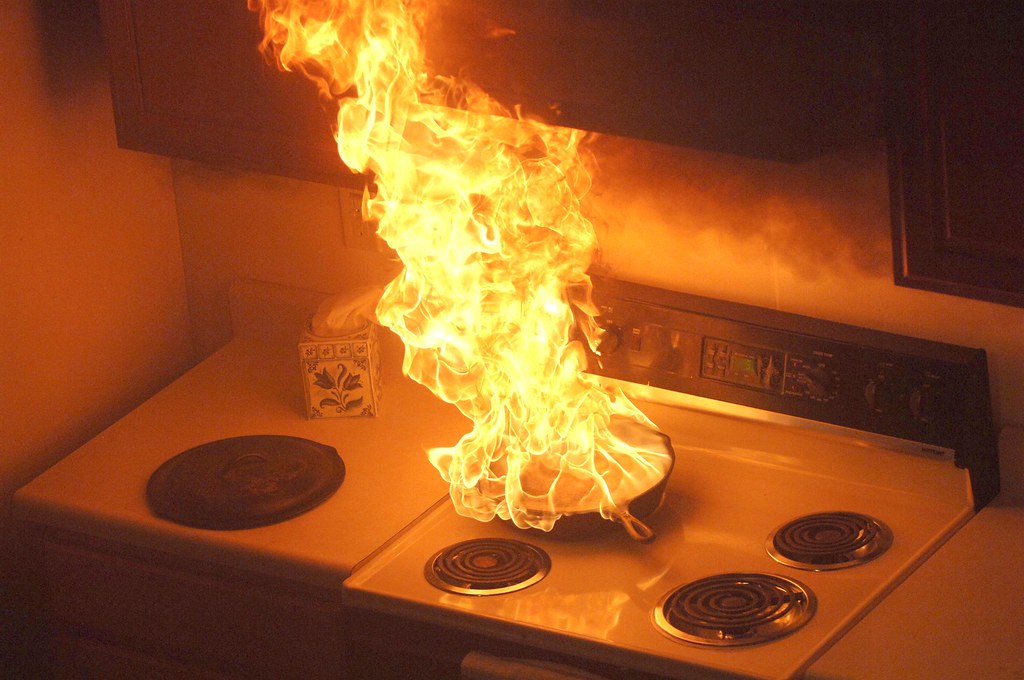
Kitchen grease fires are a leading cause of home fires and injuries. Cooking oil and grease that is left unattended on the stovetop or in the oven can ignite, causing kitchen cabinets to catch fire and potentially burn down your house. You can prevent kitchen grease fires by staying at the stove while cooking, turning pot handles inward towards the center of the stove, and keeping anything that can catch fire at least 3 feet away from the stove.
There are several other kitchen fire hazards to be aware of. Never leave cooking oil unattended on the stovetop, especially if it begins to smoke. Oil can ignite at much lower temperatures than what you might expect. If your pan smokes, remove it from the heat immediately, and if it has a tight-fitting lid, place it over the top and turn off the burner.
Never Leave Food Cooking PreHeated:
Never leave food cooking in an oven that is not fully preheated. This can cause the oven to catch fire, which spreads quickly due to the flammable insulation in many newer model ovens. Anyone working with a hot stove or open flame should wear non-flammable clothing such as cotton and not wear anything made of synthetic fibers.
Oven mitts are not oven-safe:
Make sure your pot holders or oven mitts are thick enough to protect you from the heat, and never let them dangle over the stovetop where they might catch fire. Keep flammable items such as towels or aprons away from the heat source.
Cleaning Grease Off Utensils:
If you are using a metal spatula in your cooking, be sure to clean it thoroughly before using it for anything else. If you accidentally leave some grease on the spatula and then use it to stir things in a storage container, there is a chance that you could ignite the grease and start a fire.
Be cautious when heating oil:
The only time you should heat cooking oil is to fry, and it’s best not to use an open flame for this purpose. Instead, use a deep-fryer or electric skillet. If you don’t have either of those available, heat your oil in a heavy-bottomed saucepan or frying pan, and keep it at medium. Never leave the kitchen while you are heating oil.
Use the proper stove:
Make sure your stove is properly vented so that flames and heat won’t escape and ignite nearby curtains or furniture. If you have an electric stove, place pot handles inward towards the center so that nobody will inadvertently bump them and knock your pot onto the floor.
Keep flammable items away from the stove:
If you have a gas stove, it’s best to keep anything that can catch fire, such as towels or clothing, at least 3 feet away. If you have an electric stove, be sure to keep paper, plastic, or anything that could melt away from it.
Never fry Fatty Food near the stove:
When you are frying fatty foods, never do so near an open flame if at all possible. If you must fry these types of foods over a gas burner, be sure to turn off the burner before adding anything else to the pan. If you have another burner available, try using that one instead.
Use a Class B Fire Extinguisher:
A class B fire extinguisher is the best choice for fighting fires that involve flammable liquids, such as oil or grease.
Fires are typically fought with one type of specialized product- they come in size small to large depending on how big your problem might be!
If you find yourself experiencing an emergency situation where someone has spilled coffee all over their kitchen cabinet then chances are good these tools will allow enough time before needing professional help so nothing too drastic happens but make sure it’s used correctly every single time – either check online what exact model number would work best by looking up ‘class B, choosing US standard sizes first if possible then finding UK counterparts afterward.
Don’t Use Water to Put Out Grease Fires:
Never attempt to put out kitchen grease fires by flushing them with water. This spreads the flames even further and can cause serious injuries. Use a Class B fire extinguisher, or smother it with baking soda or salt instead.
You can find more information about kitchen fires here: http://www.dummies.com/home-garden/home-improvement/how-to-avoid-kitchen-fires/
Final Words
In addition to these tips, be sure to read your oven manual for other useful information about how to safely use your stove and oven. Moreover, for better kitchen fire safety equipment such as extinguishers and suppression systems contact Capital Solution Fire and safety Experts. They will provide high-quality fire safety products at reasonable rates all over Pakistan.